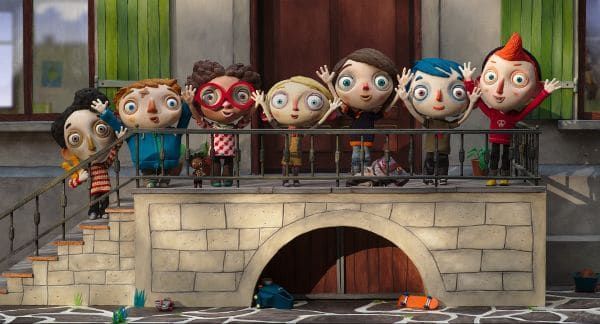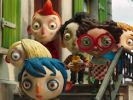Eye For Film >> Movies >> My Life As A Courgette (2016) Film Review
My Life As A Courgette
Reviewed by: Amber Wilkinson

This moving and uplifting stop-motion film may have taken 14 years to get from concept to cinemas and only run at a trim 66 minutes, but first-time feature director Claude Barras packs more emotion and truth into the hour than most family films manage in 90 minutes.
Celine Sciamma, adapting from the novel by Gilles Paris, and with additional input from Baras, Morgan Navarro and German Zullo, has the rare skill of writing scripts (most notably Tomboy) that, though they are about children, have plenty to say to an adult audience as well - all without excluding the younger demographic.

If you heard the story in a casual conversation - young kid with an alcoholic mum who dies suddenly ends up having adventures in a children's home - it might feel as though you've been here before. Bleak orphanages abound in cinema, from Annie to Oliver. This one is different from most, as young Icare (Courgette to all his friends) finds a warm welcome and the children quite different from the usual orphan stereotypes.
All of them have a troubled past - parental difficulties that are firmly located in modern society and which include drug taking and deportation. Things aren't easy for Courgette (Gaspard Schlatter on vocals in the French language version reviewed here) at first, particularly because the home seems to have a resident bully Simon (Paulin Jaccoud), although we soon discover there's another side to this flashy show-off. All the children have a level of anxiety - one taps a plate nervously, another hides in a cupboard to avoid an outing with her unpleasant aunt - but their chief problem is that they are afraid of loneliness. As one of them heartbreakingly puts it: "There's nobody left to love us."
Things are going to change for them for the better, of course, but Sciamma and Barras show this forming of tentative friendships as a gradual and ongoing process that brings mixed emotions. The script has a heartfelt carefulness but it is never preachy, with 'naughty' conversations about the home's teacher's willy exploding likely to have pre-adolescents (and adults who well remember these sorts of conversations) hooting with laughter.
The animation also strikes and emotional note from the off, as we see Courgette drawing pictures - art within the art. Everything has a tactile quality and no moment is wasted, so that, for example, the passage of time is marked by a single leaf seen slipping from a tree. The children are, to an extent, colour-coded. Courgette's blueness matches his mood, while Simon's red is as angry as he is. But they are all far from one-note, with even the minor characters given room to show how their lives are adapting for the better. Their large expressive eyes, allow Barras a range of almost micro-emotions, allowing them to be sad but also hopeful, happy and crying, sometimes all at the same time.
They remind us that, like the drawings on the kite that Courgette makes at the start of the film, we all have the capacity to be a little bit chicken or a superhero - but that even more negative attributes shouldn't stand in the way of flying high, once you're given and accept a bit of support.
Reviewed on: 07 Jun 2017



















